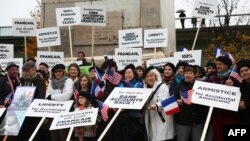Banking problems, administrative worries, threats of tax reassessments or lawsuits — thousands of French people have problems because U.S. law demands they pay U.S. taxes, even though they have few connections to the United States. They are American citizens who were born in the U.S., but left the country as children. A French parliamentary report says Paris should do more to protect such dual nationals from a tax law they see as unfair.
The U.S. Foreign Account Tax Compliance Act, known as FATCA, forces banks wanting to operate in the U.S. to report assets held by American citizens overseas. France signed onto FATCA in 2013, creating problems for many American expats and dual nationals who have since been rejected by retail banks seeking to avoid hassle and risk.
The European Banking Federation estimates there are about 300,000 accidental Americans in Europe.
By "accidental," they mean people who have dual citizenship and who are U.S. born but left as children — some only few weeks after their birth — and never established a life in the U.S.
Still, the Internal Revenue Service or IRS says they must declare their income and pay taxes on it.
Fabien Lehagre is president of the Accidental Americans Association (AAA), which has more than 800 members. Lehagre left the U.S. at 18 months and returned once as a tourist 26 years later.
To avoid bureaucratic headaches dealing with the IRS, many banks simply refuse to deal with American customers.
Lehagre complains that when he wants to invest money in stocks or life insurance, or open a bank account online, it is impossible, as he is seen as a U.S. person and banks do not want to take risks. "Our first hurdle is banking," he said.
FACTA is intended to fight tax evasion. However, the U.S. Congress never voted to help other nations track their citizens' tax obligations, so foreigners can open bank accounts in the United States without their own country being notified.
French lawmaker Laurent Saint-Martin studied the issue and says France should renegotiate its FATCA tax treaty with the U.S. and consider unilaterally pulling out if it can’t win concessions to protect dual nationals.
He wants a moratorium on the agreement between France and the United States, as long as Europe does not get reciprocity from Washington. It would also be an opportunity to review the full agreement to solve the specific issue of accidental Americans who should not pay U.S. taxes.
Several European delegations have discussed the issue at the U.S. State Department and the IRS, but so far, the Trump administration has not shown any willingness to renegotiate FACTA to end the burden on accidental Americans.





